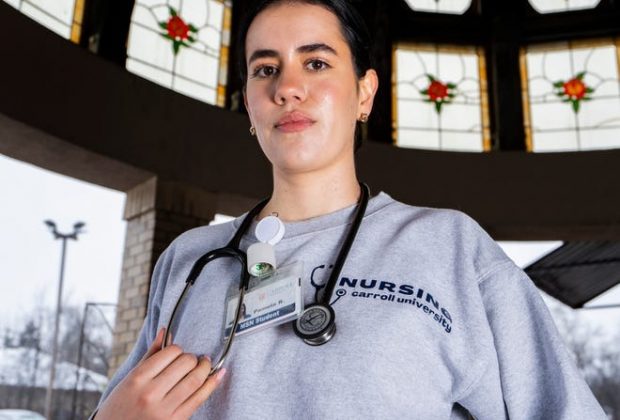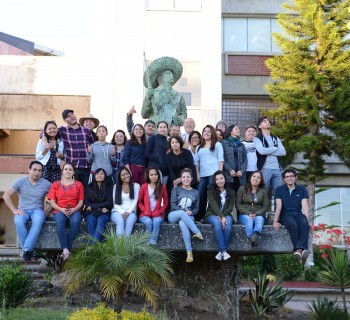By Ricardo Torres | Milwaukee Journal Sentinel | JAN. 16, 2024 | Photo By Jovanny Hernandez
Wisconsin desperately needs nurses, and Pamela Rubalcava is planning to graduate in the spring with a degree in nursing from Carroll University.
But Rubalcava might not be able to get a license because she is a DACA recipient.
Deferred Action for Childhood Arrivals provides protection from deportation to people like Rubalcava who came to the United States as children. It also allows them to get a driver's license, serve in the military and go to college if they renew their DACA status every two years.
However, in Wisconsin, licenses granted by the Department of Safety and Professional Services are off limits to people like her.
But that could change soon.
There are four bills in the state Legislature that aim to help DACA recipients get jobs, in-state tuition and a small tax credit. This comes at a time of record low unemployment, where employers in virtually every industry are struggling to find workers.
DACA and law enforcement bill awaits Senate action
A bill allowing DACA recipients to serve as local law enforcement officers passed the Assembly 95 to 4, and is waiting to be voted on in Senate. Law enforcement agencies around the state have felt a need for more officers for the last several years.
Three other bills in the Assembly would allow DACA recipients to get professional licenses to serve as nurses, teachers and any other credential administered by the state.
“I feel like my future is not in my hands,” Rubalcava said. “It’s up to whoever wants to make that decision. That’s where we’re at right now.”
Another bill would allow DACA recipients to receive in-state tuition, and another would provide a $250 tax credit to DACA recipients who have to pay roughly $500 every time they renew their status.
Democrat Gov. Tony Evers told the Daily Cardinal, the student newspaper at the University of Wisconsin-Madison, he supports the bill to lower tuition for DACA recipients.
“The governor has long urged the Legislature to pass common-sense proposals to support DACA recipients, and he’s glad to see several initiatives he’s proposed receive bipartisan support," Evers communications director Britt Cudaback said.
"Gov. Evers remains disappointed, however, that Republicans continue to ignore business leaders, farmers and agricultural industries, and law enforcement groups, among others, in failing to expand access to driver’s licenses to help keep our roads safe and make sure workers can get from Point A to Point B.”
Evers has pushed for driver's licenses for undocumented immigrants in his biennial budgets, but those proposals have been taken out by the Republican-controlled Legislature.
Economists have been saying for years that Wisconsin needs more eligible workers. The lack of available bodies to fill jobs is likely to be a factor in Wisconsin for the coming years.
Two jobs available for every job seeker
There are roughly two job openings for every job seeker, and that’s been the status quo for the last several years. Businesses have tried to raise wages and increase benefits to lure workers.
Besides luring people from other states to work in Wisconsin, immigration and DACA recipients specifically could help relieve some of the workforce stress.
If the bills don’t get passed and signed into law, Rubalcava said, she will likely move to Illinois, a state that does allow DACA recipients to be nurses, and build a life there.
More:They grew up legally in Wisconsin. Green card backlogs mean they may have to leave the U.S.
"If this law does pass, then great. I can move on with my life (in Wisconsin). I can continue as I planned,” Rubalcava said. “With immigration, it’s always been you get your hopes up and then nothing happens.”
Macco: Some Republicans are 'intellectually lazy' on DACA
But the focus from lawmakers on these bills is not about immigration, it's about the economy.
And that focus on the economy is what has drawn bipartisan support in the Assembly for the legislation, but more Republicans will be needed for the legislation to pass.
When it comes to DACA and his fellow Republicans, state Rep. John Macco, R-Green Bay, says some them are “intellectually lazy” on the subject.
“The reason why some folks on my side of the aisle are having a little bit of problem with it is because they don’t take the time, they’re intellectually lazy, and they don’t take the time to really look and understand what a DACA recipient is,” Macco said.
“So they just lump it all together with immigration and go ‘The immigration thing is a mess, Congress needs to fix it.’ And they wash their hands like Pontius Pilate and walk away.”
Macco shares similar positions on immigration as many Republican lawmakers, but he is empathetic to DACA recipients.
“You need to build that wall, all the way across (the southern border) and we need to make sure we have a quality immigration program,” Macco said. “But we got a bunch of kids in here who came here when they were 7, how much control did you have where you lived when you were 7 years old?”
State Rep. Sylvia Ortiz-Velez, D-Milwaukee, said she saw the work Macco was doing on DACA and workforce development and is "happy to stand-by to make sure Rep. Macco gets whatever he needs to be successful."
“Our parties have gotten so partisan over time, and that part of the conversation has gotten lost. We’re in this together,” Ortiz-Velez said. “If we succeed, we succeed together. If we fail, we fail together. We’re all in this together, and we have to remind each other of that.”
State Senate could delay or kill passage of legislation
Both Ortiz-Velez and Macco are confident the bills will pass the Assembly, but they’re not so sure about the Senate.
“We’re going to need a lot of help in the Senate,” Ortiz-Velez said. “Sometimes that’s what happens. Sometimes we get a better deal coming out of the Senate. ... We need at least 17 senators. Not just any senators, we need 17 Republican senators.”
In December, Macco and Ortiz-Velez spoke at Carroll University on workforce development in Wisconsin and DACA. They were asked about what citizens could do to help push the bills forward.
“Call and get your Republican state senator to sign onto our bills. That’s it,” Macco said. “I got the House, (Ortiz-Velez) got the House. We both got the House, don’t worry about that. ... We need 17 senators lined up.”
DACA recipients do not have citizenship, and Macco and Ortiz-Velez urge Congress to pass legislation at the federal level to create a path for them to become citizens.
“Congress needs to move,” Macco said. “This is the first step, but Congress needs to get off their rear end and figure out a way for these folks to become full-fledged U.S. citizens. So they can apply for the position (of citizenship) and move into the security of that.”
'I might not be able to work'
In 2005, Rubalcava was 7 years old when she came to the United States with her family from Aguascalientes, Mexico.
“When I got here I knew that my status was different. I didn’t really know what that meant,” Rubalcava said. “I also grew up with my parents telling me ‘Don’t tell anyone.’ Because it was a fear that you could get deported. And I was a kid. I believed it. I never questioned it.”
Children often learn a language quicker than adults. And Rubalcava went with her parents to their doctor’s appointment to help them.
“Growing up I was always the medical interrupter person for my parents,” Rubalcava said. “I was kind of forced into this role of ‘How do I translate kidney, without knowing as a kid?’ Riñón.”
She graduated from Rufus King High School in 2018 and got a bachelor’s degree from Herzing University and decided to go into nursing school at Carroll University.
Rubaclava got interested in nursing when she worked as a health room assistant at the United Community Center on Milwaukee’s south side.
As she enters her final semester of nursing school, she’s still not quite sure what field she wants to work in. Rubaclava is starting an externship at Aurora St. Luke’s Medical Center and a clinical placement at Children’s Wisconsin.
At St. Luke’s she’ll work in three different units, each for four weeks until May. And if there’s an area she wants to stay in, the hospital could offer her a job in that area.
“Little do they know I might not be able to work,” Rubaclava said.







